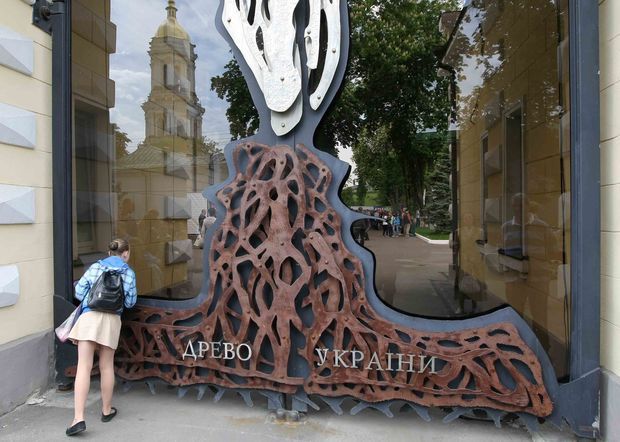Fighting propaganda with education
Developers of website LIKBEZ. Historical Front intend to refute the myths and stereotypes surrounding Ukrainian history
The educational project “LIKBEZ. Historical Front,” despite having been presented only a few weeks ago, has gained considerable publicity, which, according to its initiators, no one even expected. The project has even faced technical problems associated with the large influx of visitors over the recent days.
Let us recall that its authors intended to create a kind of online directory where all concerned would be able to find the answers to questions like “What Ukraine is?”, “history of Ukraine,” “territory of Ukraine” – that is, most discussed and most misrepresented issues. Historians, a dozen in total, who are working to fill the website with content under the leadership of the project coordinator, Candidate of Science in History and Den’s contributor Kyrylo Halushko, seek to dispel myths and stereotypes that exist about the topic of Ukrainian identity, country, state and nation’s development, and provide accessible coverage of the origins and development of the Ukrainian-Russian conflicts.
All the content relies only on documents and historical facts. The website has three sections: “Actual” (dealing with Crimea, the Donbas, and south-eastern regions of Ukraine), “Eternal” (covering a wide range of issues of national history, from the origin of the Ukrainians to the Nazi collaboration in World War II), and “Information Source” (putting documents, maps, and historical literature online).
The project’s developers plan to continue the tradition and use the best achievements of their predecessors, including legacy of Den/The Day. “When compiling our press releases and answering journalists’ questions, I always mention the Ukraine Incognita website and books from Den’s Library as examples of brilliant historical projects,” Halushko told us. “Our work is an attempt to help our senior colleagues. I am convinced that we do a common work with them. This much attention to the website indicates that the issue of combating historical myths amid a war and a Russian propaganda offensive is of great interest to the public. People want to equip themselves not only with guns and body armor, but knowledge as well. It is very pleasing to us.”
Interestingly, the professional community’s response to the initiative has been ambiguous. “Some colleagues perceive our website as one full of counter-propaganda in the Russian style, as an attempt to fight one lie with another,” Halushko explained. “Actually, it is an educational project that provides information on topics of public interest. Of course, the anti-Ukrainian forces’ coverage of our issues serves as our starting point, but our response is of academic nature, as it is created by professional historians who value their reputations. We fight propaganda with education. Indeed, the balance is not easy to find, and we get criticized from all sides. In addition to Little Russians or Novorossians [pro-Russian elements and separatist supporters. – Ed.] and people of too patriotic views who would like us to extend the Ukrainians’ existence back into the Paleolithic age, so-called ‘liberal’ historians reproach us as well. The latter are trying to stay above the fray and see any attempts to popularize Ukrainian history as propaganda and imposition of the official line (even though the government is not involved in our project). Sitting next to these three poles, we try to stay on the scholarly and Ukrainian position as long as it is objective and does not contradict the common sense.”
By the way, the discussion about “demythologization” and “denationalization” of history and, in particular, school textbooks has long been going on in Ukraine. “The 2014 situation has clearly shown that should we resort to active denationalization of Ukrainian history, our citizens will be brought up on Vladimir Putin’s propaganda,” Halushko maintained. “I believe that a school history textbook should nurture Ukrainian patriots. Of course, it applies only if we want to live in Ukraine, and not in Novorossia... Do not be afraid of ‘nationalization,’ because we have no official line on history, while differing opinions may be expressed freely, and historians often disagree.”
The “LIKBEZ. Historical Front” project is funded by voluntary contributions, following the organizers’ appeal for help on social networks, and the public bears all the costs of maintenance, website design and so on. The state, as represented by the Institute of National Remembrance and the Information and Analysis Center of the National Security and Defense Council of Ukraine, provides only information support so far.
The project targets primarily the Russian-speaking audience. As the confrontation is now focused on Crimea and Donbas, that is, on people whose minds were mostly captivated by non-Ukrainian views before the current dramatic events, the website’s contributors work on the Russian version first, which is now ahead of the Ukrainian one by about a week in its content. By the way, Russian historians have so far not responded to the initiative of their Ukrainian colleagues. The English version of the website is planned as well. “The Russian-Soviet historiography has traditionally been very influential in the West,” Halushko concluded. “Western historians have been working with it for at least 150 years. The post-imperial Russian historiography, which is more liberal and tolerant on the Ukrainian question, does not have much of an impact there so far. However, we do not focus on the Western historians, but on the general public, which generally knows little about Ukraine. Therefore, the main goal for us today is promotion of our country.”






